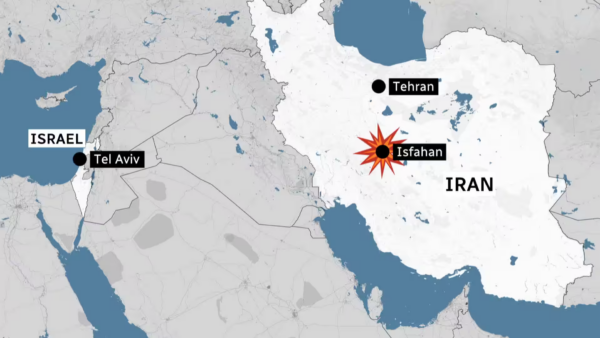By Parisa Hafezi and James Mackenzie
Explosions echoed over an Iranian city on Friday in what sources described as an Israeli attack, but Tehran played down the incident and indicated it had no plans for retaliation – a response that appeared gauged towards averting region-wide war.
The limited scale of the attack and Iran’s muted response appeared to signal a successful effort by diplomats who have been working to avert all-out war since an Iranian drone and missile attack on Israel last Saturday.
Iranian media and officials described a small number of explosions, which they said resulted from air defences hitting three drones over the city of Isfahan in central Iran. Notably, they referred to the incident as an attack by “infiltrators”, rather than by Israel, obviating the need for retaliation.
A senior Iranian official told Reuters there were no plans to respond against Israel for the incident.
“The foreign source of the incident has not been confirmed. We have not received any external attack, and the discussion leans more towards infiltration than attack,” the official said.
Jonathan Lord, head of the Middle East security program at the Center for a New American Security, a U.S. think tank, said that “seems to indicate that Iran is seeking to step down off the ledge, minimize the impact of the attack, and perhaps walk back down the escalation ladder from here”.
Israel said nothing about the incident and its ally Washington refused to be drawn. Asked about it repeatedly at a press conference in Italy, U.S. Secretary of State Antony Blinken said he would not comment apart from to say that the United States was committed to Israel’s security but not involved in any offensive operations.
Violence between Israel and Iranian proxies across the Middle East has intensified throughout six months of bloodshed in Gaza, raising fears the longstanding foes’ shadow war could spiral into a direct conflict.
Israel had said it would retaliate after Saturday’s strikes, the first ever direct attack on Israel by Iran, which caused no deaths after Israel and its allies shot down hundreds of missiles and drones.
Tehran launched those attacks in response to a presumed Israeli airstrike on April 1 that destroyed a building in Iran’s embassy compound in Damascus and killed several Iranian officers including a top general.
CALLS FOR CALM
Allies including the United States had pressed all week to ensure any further retaliation would be calibrated not to provoke more escalation. The British and German foreign ministers visited Jerusalem this week, and Western countries tightened sanctions on Iran to mollify Israel.
There was no word from Israel on Friday as to whether further action might be planned. Apart from direct strikes on Iranian territory, it has other ways of attacking, including cyber attacks and strikes on Iranian proxies elsewhere.
In a sign of pressure within Israel’s hard-right government for a stronger response, Itamar Ben Gvir, the far-right national security minister posted a single word on X after Friday’s strikes: “Feeble”.
Countries around the world called for calm.
“In light of reports of strikes on April 19th, we urge all parties to work to prevent further escalation,” foreign ministers of the Group of Seven industrialised democracies said in a joint statement at the end of a meeting in Italy attended by Blinken.
They also called for a ceasefire in the Gaza Strip, the release of hostages held there by Hamas, an influx of aid for civilians in Gaza, and for Israel to hold off from attacking Rafah, the last refuge for more than a million Gazans.
“It is absolutely necessary that the region remains stable and that all sides restrain from further action,” European Commission head Ursula von der Leyen said. Similar calls came from Beijing, Moscow and Arab states in the region.
In financial markets, global shares eased, oil prices surged and U.S. bond yields fell as traders worried about the risks.
NO MENTION OF ISRAEL
In Iran, news reports on Friday’s incident made no mention of Israel, and state television carried analysts and pundits who appeared dismissive about the scale. An analyst told state TV that mini drones flown by “infiltrators from inside Iran” had been shot down by air defences in Isfahan.
Shortly after midnight, “three drones were observed in the sky over Isfahan. The air defence system became active and destroyed these drones in the sky,” Iranian state TV said.
Israeli media avoided quoting Israeli officials directly, instead referring to foreign media reports that cited Israeli sources as confirming Israel was behind the attacks.
Some Israelis suggested the aim was to demonstrate the capability to attack without causing harm. One newspaper likened it to a biblical story of the future King David snipping a piece from the robe of a foe when given a chance to kill him.
Iranian President Ebrahim Raisi had warned Israel before Friday’s strike that Tehran would deliver a “severe response” to any attack on its territory.
Iran told the United Nations Security Council on Thursday that Israel “must be compelled to stop any further military adventurism against our interests” as the U.N. secretary-general warned that the Middle East was in a “moment of maximum peril”.
By morning, Iran had reopened airports and airspace that were shut during the strikes.
Israel’s assault on Gaza began after Hamas Islamists attacked Israel on Oct. 7, killing 1,139, according to Israeli tallies. Israel’s military offensive has killed 34,000 Palestinians in Gaza, according to the Gazan health ministry.
Iran-backed groups have declared support for Palestinians, carrying out attacks from Lebanon, Yemen and Iraq, raising fears the Gaza conflict was growing into a wider regional war.
Meanwhile in the French capital Paris, police cordoned off the Iranian consulate, where a man was threatening to blow himself up, Europe 1 radio and BFM TV. Police were on the scene.
REUTERS


Leave a Reply
You must be logged in to post a comment.